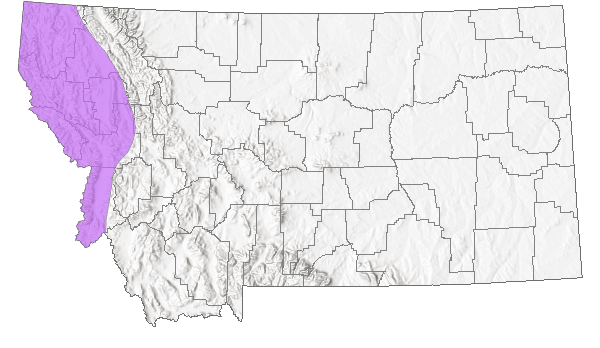View in other NatureServe Network Field Guides
NatureServe
Montana
Utah
Wyoming
Idaho
Wisconsin
British Columbia
South Carolina
Yukon
California
New York
Annual Agoseris - Agoseris heterophylla
Native Species
Global Rank:
G5
State Rank:
S3S4
(see State Rank Reason below)
C-value:
Agency Status
USFWS:
USFS:
BLM:
External Links
State Rank Reason (see State Rank above)
Agoseris heterophylla occurs throughout the western United States. Since 1900 plants have been documented in scattered locations of western Montana. Though herbaria records are relatively few, field observations have found plants to be common (at least on a local scale), to grow in both disturbed and undisturbed habitats, and threats have not been recognized. Current data on locations, population sizes, threats, and how it responds to disturbances in Montana is greatly needed.
- Details on Status Ranking and Review
Range Extent
ScoreF - 20,000-200,000 sq km (~8,000-80,000 sq mi)
Comment28,977 square kilometers for 20 discrete locations.
Area of Occupancy
ScoreD - 6-25 4-km2 grid cells
CommentMontana can be divided into 30,390 4x4 square kilometer cells. For this species plant observations occur in 18 of these 4x4 square kilometer cells.
Number of Populations
ScoreB - 6 - 20
Comment24 observations: 5 (1900-1955), 22 (1972-2014). They represent 20 unique locations.
Number of Occurrences or Percent Area with Good Viability / Ecological Integrity
ScoreC - Few (4-12) occurrences with excellent or good viability or ecological integrity
Comment6 observations assumed to be of good viability based on comments of locally common, locally frequent, or frequent.
Environmental Specificity
ScoreC - Moderate. Generalist or community with some key requirements scarce
CommentHabitat is grasslands and shallow soils of rock ledges which are common. Some observations occur in disturbed pasture or clearcut habitats.
Threats
ScoreD - Low
General Description
PLANTS: Annual herbs that grow 4 to 25 cm tall from a taproot. Source: Lesica et al. 2012
LEAVES: Basal leaves are 2-10 cm long, oblanceolate, and with smooth (entire) or dentate margins. Hairs are soft, short, and sparse (puberulent) to long, soft, crooked and un-matted (villous). Source: Lesica et al. 2012
INFLORESCENCE: A solitary yellow flowerhead. The involucre is 1-2 cm high with the bracts (phyllaries) arranged in 2 to 3 rows (series). The outer involucral bracts are often spotted, lanceolate shaped, and villous with dark-septate hairs. Ray petals are yellow and 2–4 mm long. Pappus is 4–9 mm long. Achene (fruit) body is 2–5 mm long and beak is 7–10 mm long. Source: Lesica et al. 2012
Agoseris comes from the Greek words of agos meaning 'leader' and seris meaning 'chicory', but what this refers to is unclear (Baird in Flora of North America [FNA] 2006).
Diagnostic Characteristics
Agoseris species in Montana share the following characteristics:
*Solitary flowerhead composed only of ray (ligulate) flowers; each ray tipped with 5 lobes.
*Single, long flowering stem (peduncle) that has milky sap;
*Leaves are only basal; each leaf with a simple blade that tapering to the stem (petiole).
Annual Agoseris -
Agoseris heterophylla*Life Span: Annual
*Flowers (Corollas): Yellow
*Leaf Blades: Not lobed; entire to slightly dentate.
Orange Agoseris -
Agoseris aurantiaca*Life Span: Perennial
*Flowers (Corollas): Orange to pink, often drying light purple
*Leaf Blades: Entire, dentate, or with shallow lobes.
Steppe Agoseris -
Agoseris parviflora*Life Span: Perennial
*Flowers (Corollas): Yellow
*Leaf Blades: Lobes divided half-way to the midvein.
*Involucral Bracts: Glabrous or tomentose.
*Achene Beak: Less than 6 mm long.
Large-flower Agoseris -
Agoseris grandiflora*Life Span: Perennial
*Flowers (Corollas): Yellow
*Leaf Blades: Lobes divided half-way to the midvein.
*Involucral Bracts: Villous on the margins.
*Achene Beak: At least 8 mm long.
Pale Agoseris -
Agoseris glauca*Life Span: Perennial
*Flowers (Corollas): Yellow
*Leaf Blades: Entire or with shallow lobes that are less than half-way to the midvein.
Species Range
Montana Range
Range Descriptions

 Native
Native
Range Comments
Agoseris is a New World genus meaning that all species occur in North America (Baird in FNA 2006). However, there is an exception and that is one species that is found in the temperate regions of southern South America (Baird in FNA 2006).
Annula Agoseris occurs in British Columbia and Montana south to California, Arizona, and New Mexico (Baird in FNA 2006).</in>
Observations in Montana Natural Heritage Program Database
Number of Observations: 24
(Click on the following maps and charts to see full sized version)
Map Help and Descriptions
Relative Density

Recency



 (Observations spanning multiple months or years are excluded from time charts)
(Observations spanning multiple months or years are excluded from time charts)
Habitat
Grasslands and shallow soil of rock ledges in the valley zones of Montana (Lesica et al. 2012).
Ecology
POLLINATORSThe following animal species have been reported as pollinators of this plant species or genus where their geographic ranges overlap:
Bombus bifarius and
Bombus insularis (Wilson et al. 2010).
Stewardship Responsibility
References
- Literature Cited AboveLegend:
 View Online Publication
View Online Publication Lesica, P., M.T. Lavin, and P.F. Stickney. 2012. Manual of Montana Vascular Plants. Fort Worth, TX: BRIT Press. viii + 771 p.
Lesica, P., M.T. Lavin, and P.F. Stickney. 2012. Manual of Montana Vascular Plants. Fort Worth, TX: BRIT Press. viii + 771 p. Wilson, J.S., L.E. Wilson, L.D. Loftis, and T. Griswold. 2010. The montane bee fauna of north central Washington, USA, with floral associations. Western North American Naturalist 70(2): 198-207.
Wilson, J.S., L.E. Wilson, L.D. Loftis, and T. Griswold. 2010. The montane bee fauna of north central Washington, USA, with floral associations. Western North American Naturalist 70(2): 198-207.
- Additional ReferencesLegend:
 View Online Publication
View Online Publication
Do you know of a citation we're missing? Lesica, P., M.T. Lavin, and P.F. Stickney. 2022. Manual of Montana Vascular Plants, Second Edition. Fort Worth, TX: BRIT Press. viii + 779 p.
Lesica, P., M.T. Lavin, and P.F. Stickney. 2022. Manual of Montana Vascular Plants, Second Edition. Fort Worth, TX: BRIT Press. viii + 779 p.
- Web Search Engines for Articles on "Annual Agoseris"





